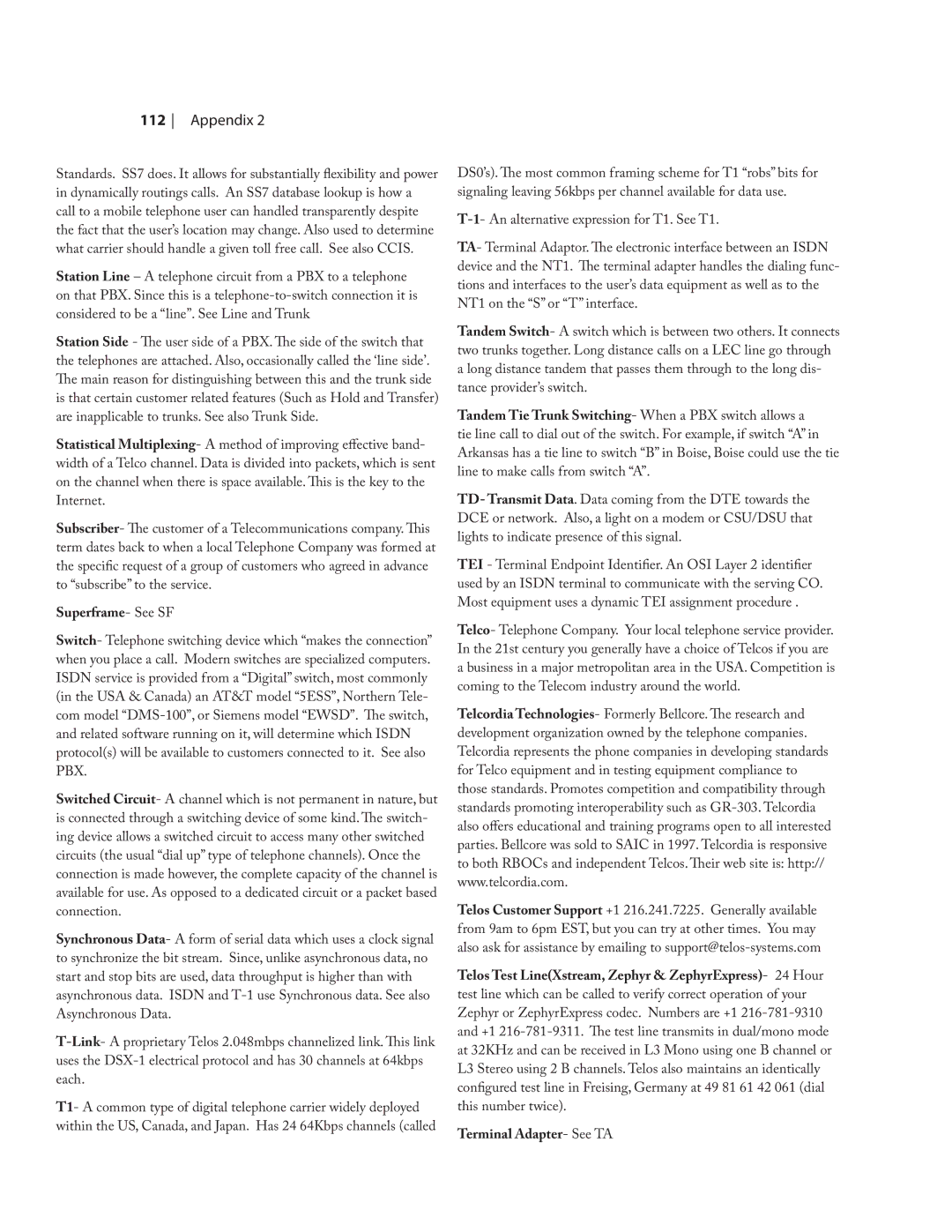112 Appendix 2
Standards. SS7 does. It allows for substantially flexibility and power in dynamically routings calls. An SS7 database lookup is how a call to a mobile telephone user can handled transparently despite the fact that the user’s location may change. Also used to determine what carrier should handle a given toll free call. See also CCIS.
Station Line – A telephone circuit from a PBX to a telephone on that PBX. Since this is a
Station Side - The user side of a PBX. The side of the switch that the telephones are attached. Also, occasionally called the ‘line side’. The main reason for distinguishing between this and the trunk side is that certain customer related features (Such as Hold and Transfer) are inapplicable to trunks. See also Trunk Side.
Statistical Multiplexing- A method of improving effective band- width of a Telco channel. Data is divided into packets, which is sent on the channel when there is space available. This is the key to the Internet.
Subscriber- The customer of a Telecommunications company. This term dates back to when a local Telephone Company was formed at the specific request of a group of customers who agreed in advance to “subscribe” to the service.
Superframe- See SF
Switch- Telephone switching device which “makes the connection” when you place a call. Modern switches are specialized computers. ISDN service is provided from a “Digital” switch, most commonly (in the USA & Canada) an AT&T model “5ESS”, Northern Tele- com model
Switched Circuit- A channel which is not permanent in nature, but is connected through a switching device of some kind. The switch- ing device allows a switched circuit to access many other switched circuits (the usual “dial up” type of telephone channels). Once the connection is made however, the complete capacity of the channel is available for use. As opposed to a dedicated circuit or a packet based connection.
Synchronous Data- A form of serial data which uses a clock signal to synchronize the bit stream. Since, unlike asynchronous data, no start and stop bits are used, data throughput is higher than with asynchronous data. ISDN and
T1- A common type of digital telephone carrier widely deployed within the US, Canada, and Japan. Has 24 64Kbps channels (called
DS0’s). The most common framing scheme for T1 “robs” bits for signaling leaving 56kbps per channel available for data use.
TA- Terminal Adaptor. The electronic interface between an ISDN device and the NT1. The terminal adapter handles the dialing func- tions and interfaces to the user’s data equipment as well as to the NT1 on the “S” or “T” interface.
Tandem Switch- A switch which is between two others. It connects two trunks together. Long distance calls on a LEC line go through a long distance tandem that passes them through to the long dis- tance provider’s switch.
Tandem Tie Trunk Switching- When a PBX switch allows a tie line call to dial out of the switch. For example, if switch “A” in Arkansas has a tie line to switch “B” in Boise, Boise could use the tie line to make calls from switch “A”.
TD- Transmit Data. Data coming from the DTE towards the DCE or network. Also, a light on a modem or CSU/DSU that lights to indicate presence of this signal.
TEI - Terminal Endpoint Identifier. An OSI Layer 2 identifier used by an ISDN terminal to communicate with the serving CO. Most equipment uses a dynamic TEI assignment procedure .
Telco- Telephone Company. Your local telephone service provider. In the 21st century you generally have a choice of Telcos if you are a business in a major metropolitan area in the USA. Competition is coming to the Telecom industry around the world.
Telcordia Technologies- Formerly Bellcore. The research and development organization owned by the telephone companies. Telcordia represents the phone companies in developing standards for Telco equipment and in testing equipment compliance to those standards. Promotes competition and compatibility through standards promoting interoperability such as
Telos Customer Support +1 216.241.7225. Generally available from 9am to 6pm EST, but you can try at other times. You may also ask for assistance by emailing to
Telos Test Line(Xstream, Zephyr & ZephyrExpress)- 24 Hour test line which can be called to verify correct operation of your Zephyr or ZephyrExpress codec. Numbers are +1
Terminal Adapter- See TA
